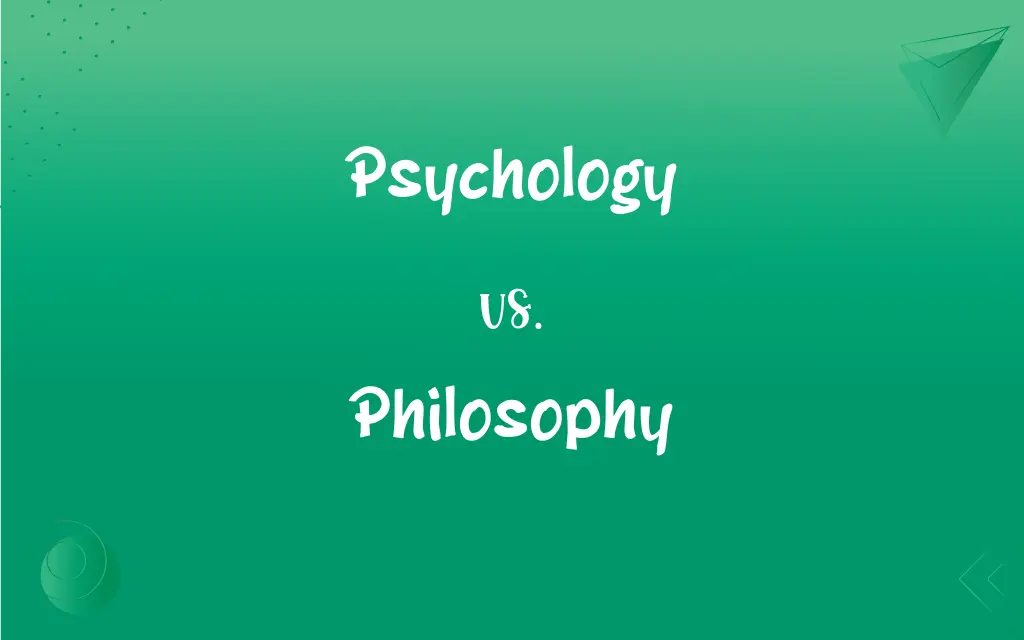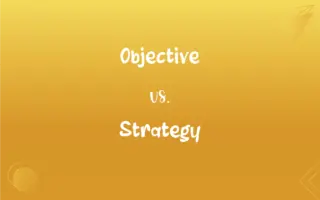Psychology vs. Philosophy: What's the Difference?
Edited by Harlon Moss || By Janet White || Published on December 9, 2023
Psychology is the scientific study of the mind and behavior, while philosophy is the study of fundamental questions about existence, knowledge, values, reason, and reality.

Key Differences
Psychology is focused on understanding the human mind and behavior, including processes like thinking, learning, and emotions. It often employs empirical methods and experimentation. Philosophy, on the other hand, delves into abstract questions and concepts such as ethics, logic, and the nature of existence, often through critical reasoning and argument.
Philosophy explores broad questions about being, knowledge, and the nature of reality, often without the need for empirical evidence. It examines beliefs, values, and the reasoning behind ideas. Psychology, however, seeks to understand and explain thought, emotion, and behavior, typically through observational and experimental methods.
In psychology, the focus is on individual and group behavior, mental processes, and how these are affected by internal and external factors. Clinical psychology, for example, addresses mental health issues. Philosophy involves critical analysis of fundamental beliefs, including questioning the principles underlying all knowledge and reality.
The methods of philosophy often involve logical argumentation and critical thinking, without the necessity of scientific experimentation. Philosophical inquiries might include the ethics of AI or the nature of consciousness. Psychology, conversely, relies on scientific methodologies, including experiments, surveys, and case studies.
Psychology can intersect with philosophy in areas like the philosophy of mind, but it remains distinct in its focus on empirical and practical aspects of human behavior and mental processes. Philosophy tends to be more speculative and foundational, dealing with questions that sometimes precede or go beyond empirical evidence.
ADVERTISEMENT
Comparison Chart
Primary Focus
Study of mind and behavior
Study of existential, ethical, and knowledge-based questions
Methodologies
Empirical research, experiments, observation
Logical reasoning, critical analysis, argumentation
Key Subjects
Mental processes, emotions, development
Ethics, metaphysics, epistemology, logic
Application
Mental health, therapy, human development
Moral reasoning, conceptual analysis, critical thinking
Intersection with Science
Closely tied to scientific methods
More abstract, often independent of empirical science
ADVERTISEMENT
Psychology and Philosophy Definitions
Psychology
Psychology is the scientific study of the mind and behavior.
In psychology, we learn how memory works.
Philosophy
Philosophy is the study of fundamental questions about existence, knowledge, and values.
Philosophy challenges us to question the nature of reality.
Psychology
It examines individual and group mental processes and actions.
Developmental psychology focuses on how people grow and change over time.
Philosophy
Philosophy influences fields like law, politics, and education.
Political philosophy examines the concepts of justice and governance.
Psychology
Psychology applies its findings in therapy and mental health.
Clinical psychology is used to treat mental illnesses.
Philosophy
It explores the underlying principles of various disciplines.
Philosophy of science questions the foundations of scientific knowledge.
Psychology
Psychology includes various fields, like clinical, social, and cognitive.
Cognitive psychology explores perception, thinking, and problem-solving.
Philosophy
It involves logical reasoning and critical analysis of ideas.
In philosophy, arguments about morality are deeply analyzed.
Psychology
It employs methods like experiments, case studies, and surveys.
Psychology uses surveys to understand social attitudes.
Philosophy
Philosophy covers branches like ethics, metaphysics, and epistemology.
Epistemology is a branch of philosophy that studies knowledge.
Psychology
The science that deals with mental processes and behavior.
Philosophy
The study of the nature, causes, or principles of reality, knowledge, or values, based on logical reasoning.
Psychology
The emotional and behavioral characteristics of an individual, a group, or those engaged in a given activity
The psychology of war.
Philosophy
A system of thought based on or involving such study
The philosophy of Hume.
FAQs
What does philosophy aim to achieve?
To explore fundamental questions about life, knowledge, and ethics.
Can psychology provide answers to philosophical questions?
It can offer insights, especially in areas like ethics or consciousness.
What is the main goal of psychology?
To understand and explain behavior and mental processes.
Do psychology and philosophy overlap?
Yes, particularly in areas like the philosophy of mind.
Can psychology be considered a science?
Yes, it's a science based on empirical research and methodology.
What distinguishes philosophical methods?
Emphasis on logical reasoning, critical thinking, and argumentation.
Does philosophy influence psychology?
Yes, especially in conceptual understanding and ethical considerations.
What methods are unique to psychology?
Empirical research, experimentation, and statistical analysis.
Are there psychological theories in philosophy?
Yes, particularly in the philosophy of mind and ethics.
What are major branches of philosophy?
Metaphysics, epistemology, ethics, and logic.
How does psychology impact mental health?
Through its application in therapy and understanding of mental disorders.
Is philosophy a type of science?
No, it's more of an abstract discipline, not based on empirical science.
What role does philosophy play in society?
It provides a foundation for critical thinking and ethical reasoning.
What are some branches of psychology?
Clinical, cognitive, social, developmental, and forensic psychology.
What's a common misconception about psychology?
That it only deals with mental illness; it's much broader.
How does psychology use empirical data?
Through experiments, surveys, and observational studies.
Can a psychologist work in philosophical areas?
Yes, especially in research and theoretical aspects.
How does philosophy contribute to education?
By teaching critical thinking and the exploration of fundamental concepts.
What's a common misconception about philosophy?
That it's purely theoretical; it has practical implications too.
What's the importance of logic in philosophy?
It's essential for constructing and analyzing philosophical arguments.
About Author
Written by
Janet WhiteJanet White has been an esteemed writer and blogger for Difference Wiki. Holding a Master's degree in Science and Medical Journalism from the prestigious Boston University, she has consistently demonstrated her expertise and passion for her field. When she's not immersed in her work, Janet relishes her time exercising, delving into a good book, and cherishing moments with friends and family.
Edited by
Harlon MossHarlon is a seasoned quality moderator and accomplished content writer for Difference Wiki. An alumnus of the prestigious University of California, he earned his degree in Computer Science. Leveraging his academic background, Harlon brings a meticulous and informed perspective to his work, ensuring content accuracy and excellence.






































































